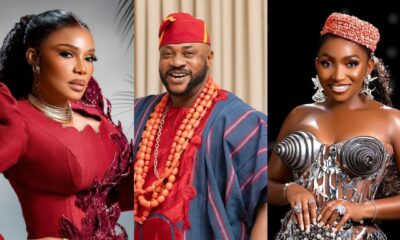Features
#JP2025: More Than Just a Wedding

To many, the stretch of celebration that defined #JP2025, the official hashtag for the union between Tanzanian singer Juma Jux and Nigerian influencer Priscilla Ojo, Iyabo Ojo‘s first daughter, may have seemed excessive. The wedding unfolded over three months, beginning with a Nikkah ceremony in Tanzania and continuing through receptions, a civil wedding, a vibrant traditional Yoruba wedding, a beachside white wedding in Lagos and the final reception in Tanzania. It quickly became the most talked-about wedding of the year, a visual spectacle of fashion, music (of course) and love. Alongside the festivities, Juma Jux released a stream of songs and an EP, using each moment to deepen his connection with fans across Africa, especially in Nigeria, where his following swelled significantly.
But #JP2025 wasn’t just another wedding.
It was, first of all, a Pan-African celebration, a cultural bridge between East and West Africa. A cultural exchange. The wedding seamlessly blended Tanzanian traditions with Nigerian, showing not only how love can cross borders, but also how culture can be both preserved and shared in the process. From the attire and food to music and rituals, each element of the ceremonies told a story of unity, respect, and mutual admiration between two vibrant cultures. For me, it was the first time seeing this kind of cultural exchange executed so intentionally, and so stylishly, on such a big scale.
More than that, it was especially a brilliant publicity move for Juma Jux. The wedding’s media coverage (BellaNaija, e calm down) doubled as a campaign for his music and personality. Each appearance became part of a larger narrative about an artist expanding his reach, not just romantically, but professionally. It’s no surprise that this amplified visibility helped secure him the East African Artist of the Year award at the 2025 Headies. The romance brought attention, but Jux’s strategic moves sealed his presence. Nigerians are now dancing to Tanzanian sounds. He also collaborated with Phyno, a renowned Nigerian rapper, on God Design, and the song instantly became a popular wedding theme.
The wedding was also an economic boost for the two countries. With events in both Tanzania and Nigeria, the celebrations reached local vendors, stylists, event planners, caterers, designers, photographers and content creators. For Nigeria, where weddings have long been more than personal milestones but platforms for economic empowerment, #JP2025 followed the same model. Tailors gained commissions. Cinematographers found new audiences. Everywhere good.
But beyond the personal, professional, and economic gains, the wedding also represented the possibility of African unity. In a continent divided by colonial borders, linguistic differences, and distant policies, cultural moments like this remind us that Pan-African identity is lived. It is in our love for fashion, for music and for flamboyant events.
#JP2025 was a wedding, yes. But it was more.




















